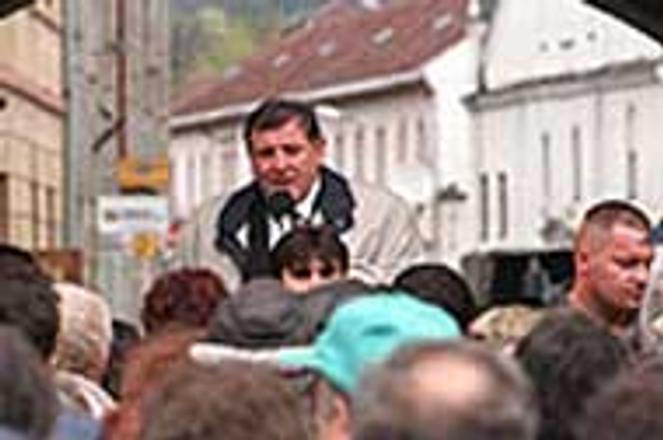He's back. Former Prime Minister Vladimír Mečiar, now a candidate in direct presidential elections set for May 15, addresses voters at a rally in the eastern Slovak town of Spišská Nová Ves. Mečiar is currently second in polls behind Košice Mayor Rudolf Schuster.photo: TASR
All the work of the ten presidential aspirants, the billboards and the speeches, may be for naught, political analysts say, most voters having apparently already decided for whom they will cast their ballots on May 15.
The first round of the electorial battle, pundits say, will probably leave Mayor of Košice Rudolf Schuster and former Prime Minister Vladimír Mečiar first and second in voting respectively. The two men will then move on to a second run-off round of voting on May 29, with the biggest vote-getter taking the presidency.
There are few dark horse candidates in the race, but analysts said that if three independent candidates - former actress Madga Vášáryová, former president Michal Kovač and academic Juraj Švec - agreed to unite and pool their support behind whichever of the three ranked highest in the polls, then that candidate might edge out Mečiar in the first round and go on to challenge Schuster.
Announcing his candidacy on April 9 after having denied such intentions for months, Mečiar immediately became Schuster's biggest rival. Schuster, who was the joint candidate of the ruling coalition, is sitting at around 36% support in the latest polls to Mečiar's 21%. Mečiar has the backing of his HZDS party, the largest opposition grouping in parliament.
According to Michal Ivantyšyn, an analyst with the independent think tank Institute for Public Affairs, Mečiar's candidacy effectively split the electorate into two antagonist camps, similar to the polarisation that was evident before the September 1998 national elections.
"Mečiar's entry [into the presidential race] remarkably strengthened the conservative attitude of the voters," Ivantyšyn said, adding that the electorate now would probably go to the polls to cast its votes for or against Mečiar, in a sort of referendum on the controversial former leader.
Despite the best efforts of the ten candidates to address voters at rallies, live talk shows and advertisements in electronic and print media, Ivantyšyn continued, the election outcome was unlikely to vary significantly from the results of the latest opinion polls.
A poll conducted by the Názory agency in late April merely confirmed the results of earlier polls taken by other agencies. According to the Názory poll, the majority of the 1,391 sample respondents would cast their votes for one of the three strongest candidates, putting Schuster on top with 36.5%, Mečiar well behind with 20.8% and former actress and diplomat Magda Vášáryová bringing up the rear with 17.3% of popular support.
People on the streets of Bratislava interviewed by The Slovak Spectator confirmed Ivantyšyn's theory that the elecorate had been divided by Mečiar's candidacy. Jozef Magula, a taxi-driver from Bratislava in his mid-forties, said that he feared the outcome of the election if Mečiar made it through into the second round. "There's always the chance that the old 'granny-democrats' [as Mečiar's elderly supporters are often ironically referred to int the media] would mobilize themselves, and no one knows what that might end with," he said.
Mečiar voters, on the other hand, claim that Mečiar is the only person who can deal with the country's worsening economic situation and falling living standards.
"I fully support Mr. Mečiar's candidacy for the presidential post," said retired Etela H. for the daily paper Slovenská Republika. "Only under his leadership we can return to the path of stability, to a calm political atmosphere and to strengthen our state interests."
The polarisation of the electorate between pro- and anti-Mečiar camps, said Pavel Haulík, director of the independent polling agency MVK, put independent candidates who were not nominated by political parties at a disadvantage.
According to Haulík, the campaign may take a surprising\ turn after the May 10 meeting of three independent candidates - Vášáryová, one-time Slovak President Michal Kováč and parliamentary deputy for the ruling SDK party and academic Juraj Švec.
The three candidates are supposed to meet on May 10 to discuss the possibility that two of them would give up their candidacies and throw their support behind whoever among them scored highest in pre-election polls. The initiative, which ruling coalitions politicians have dubbed "three for one," was proposed by 28 deputies of the ruling SDK party, who appealed to the three candidates to unite and give at least one of them a chance to enter the second round of elections, thus scuppering Mečiar's chances.
Ivantyšyn opined that the initiative could have a positive effect on the course of the election. "It would be better to have at least one independent candidate in the second round than to have none," he said.
Haulík explained, however, that the chances of an independent candidate beating Mečiar in the first round were slim due to Mečiar's "hidden voters" - supporters who throughout the ex-Prime Minister's nearly eight year reign claimed for polling agencies that they would not vote, but who in the end turned out to cast their ballots for Mečiar.
"These hidden voters may represent up to 4% of the electorate. The supporters of independent candidates, however, might not all agree to support the joint candidate [under the three for one initiative]," he said.


